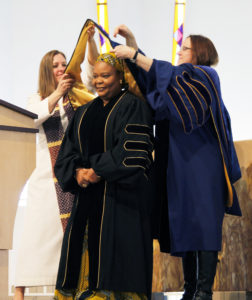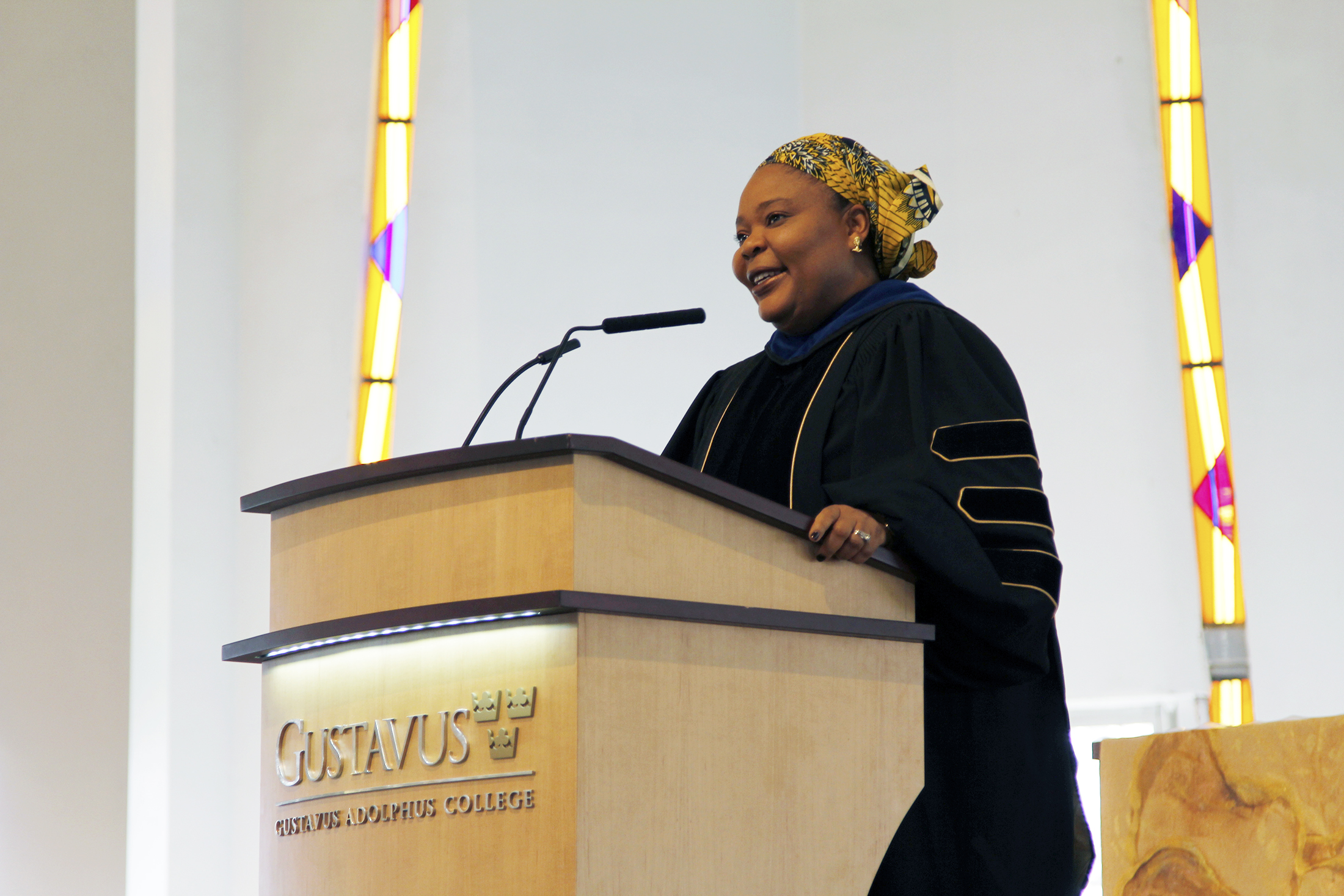This past Wednesday, May 2, 2018, Gustavus Adolphus College had the privilege of hosting the Liberian peace activist and 2011 Nobel Peace Prize Laureate, Leymah Gbowee for the annual MayDay! Peace Conference, titled, Mighty Be Our Powers: Gender, Justice, and Peacebuilding.
The day began with a welcoming ceremony that began in Christ Chapel at 10:00 a.m. with keynote addresses from Chaplain Siri Erickson, Professor of Religion, Marcia J. Bunge, President Rebecca Bergman, Professor in Political Science, Mimi Gerstbauer, and finally Leymah Gbowee, herself.
Gbowee is notorious for being a peace activist, social worker, and women’s rights advocate who led the Women of Liberia Mass Action for Peace which played a critical role in ending the Liberian Civil War in 2003.
It became an inspiring, non-violent peace movement that was fostered by the cooperation between Christian and Muslim women.
During her talk, Gbowee gave many daring and powerful remarks on peace-building, teamwork, faith, love, and courage.
Because the Liberian Civil War turned out to be a complicated conflict with about 12-14 warring factions, these groups were categorizing themselves based on religion and ethnicity.
It was important to find community between 16 ethnic groups, even though it was a challenge.
“I focused on all being women, women of faith, and women fighting for peace. The bullets reigning on us would never distinguish the Christians from the Muslims. By bringing together women of all ethnic groups, it shut down the entire conversation of ethnic divides. It shut down the focus of targeting one religious group because we had women representing the two biggest religions,” Gbowee said during her talk.
Gbowee believes strongly in the power of God, as her grandmother instilled this value at a young age.
She mentions how faith played an important part in her life, and soon became a driving force in creating change for Liberia.
“We were encouraged by everyone to be a part of some aspect of the Church, so I was – from nine years old – I was an altar girl. Church was mandatory, prayers were mandatory, this way of life was mandatory. They would make you see how important faith was, and if there was a breakthrough in someone’s prayer, we all came together to see the power of prayer. Faith just became a part of breathing.”
Even though faith was essential for Gbowee when she advocating for peace in her home country, it has also been a central value as she continues to make a difference throughout the world.
She views it as the foundation for what she wants to still accomplish in life.
“As of today, I’m working with the Gbowee Peace Foundation to bring education and opportunities to young people. My faith is asking me to embrace young people from all walks of life, and over the last six years we’ve grown from 12 students to over 140 students, and that is only by God’s grace. My faith gives me the stability to walk towards peace, it allows me to endure the speed bumps, mountains, and valleys I have to walk through for peace.”
Besides faith being a constant in her life, Gbowee also mentioned that she was inspired by the strong level of community service that adults presented while growing up.
She was not satisfied with just praying, but wanted to act upon her faith.
She definitely had many opportunities growing up in small, close-knit community where people shared clothing and food.

However, positivity was not necessarily prevalent in Gbowee’s eyes, and she questioned many aspects.
“There were moments when a husband would beat his wife, and as young as five or six my entire day would be spent asking adults, ‘why, why, why?’ I knew deep down inside there was always a sadness for anyone who was suffering from injustice. The semblance of community I had experience as a child was destroyed as a result of the war, but because the seed of social justice was planted at a young age, I knew I had to be the force of change.”
The detailed account of Gbowee’s humble beginnings as an aspiring schoolgirl with big dreams, to becoming a strong proponent for peace in the midst of a deadly civil war is further described in her book, Mighty Be Our Powers: How Sisterhood, Prayer, and Sex Changed a Nation at War, and the award-winning documentary, Pray The Devil Back to Hell.
Many students were required to read parts of the book and watch the movie in classes such as Modern Africa and Nobel Women Leadership.
Following Gbowee’s inspiring and engaging morning address, the Friends of the Library-Gustavus Library Associates sponsored a meet and greet lunch with Leymah Gbowee that was held in the Campus Center banquet rooms.
This event required pre-purchased tickets, and featured remarks from Gustavus alumni and close colleague of Leymah Gbowee, Mikka McCracken ‘09.
McCracken graduated from Gustavus as a political science major with a minor in peace studies, and is now the Director of Planning and Engagement of ELCA World Hunger. She has been a long-time friend of Gbowee.
There was also a documentary screening in Alumni Hall that was free and open to the community.
Lastly, faculty and student experts facilitated an afternoon discussion focusing on the morning lecture, book, and movie.
This was also free and open to anyone who wanted to continue engaging with informative topics related to Peace Prize winner.
Gbowee wrapped up her visit at Gustavus with the following inspirational message that she hopes young people, especially college students will take to heart:
“We’re living in a world with discrimination, war, misogyny, etc., and there is a picture that has been painted that evil has overcome good. But I want people to take a step back and look that in the midst of all this darkness, there are sparks of light — through the protest of women, through advocacy of young people, through the new wave of people speaking truth to power — and these sparks of light, if we put all of these together, are a reminder that good can overcome evil, as it has always done in centuries before. For that good to overcome evil, it means we all need to find our sparks of light and peace and put them out there! It’ll take all of us to rise up and spark our little goodness, because when we put all our sparks together, we can create a giant flame to overcome evil.”
